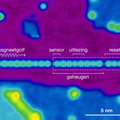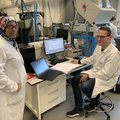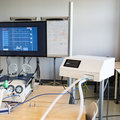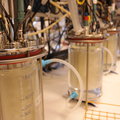Latest News
27 May 2020
Intermittent computing to replace trillions of batteries

25 May 2020
Researchers build sensor consisting of only 11 atoms

Researchers at Delft University of Technology have developed a sensor that is only 11 atoms in size. The sensor is capable of capturing magnetic waves and consists of an antenna, a readout capability, a reset button and a memory unit. The researchers hope to use their atomic sensor to learn more about the behaviour of magnetic waves, so that hopefully such waves can be used in green ICT applications one day.
25 May 2020
Evacuating virtual buildings

Virtual Reality (VR) is not just about gaming or flight simulators. At TU Delft, PhD Yan Feng is investigating how it may help explain the behaviour of pedestrians. It took her just five months to teach herself how to create a complex virtual building. By then she had built an exact replica of her faculty building and invited real people to explore and evacuate it. So how did they find their way around?
19 May 2020
Can walking and cycling make us healthy and happy?

Do walking and cycling make people healthier, or are healthier people more inclined to travel actively? And how does the coronavirus affect our travel behaviour? These are the kinds of questions that scientist Maarten Kroesen is investigating. In his view, situations are often not as simple as they might seem at first glance. He is nevertheless convinced of one thing: we should be walking and cycling more.
14 May 2020
How copper can damage a cell

Copper is important for many processes in our body. Among other things, it supports the production of red blood cells, metabolism, and the formation of connective tissue and bones. Copper is also known to play a role in diseases such as cancer, diabetes and Alzheimer's disease. Unfortunately, we do not yet know exactly what that role entails. Researchers from Delft University of Technology and the Polish Academy of Sciences have now discovered a new piece of the puzzle. In order to be able to do its work, copper binds to different types of proteins in the cell. And although the complexes that are formed in this process are not harmful in themselves, temporary 'intermediate forms' appear to arise during the binding, which can lead to damage to the cell. The results of the research have been published in Angewandte Chemie.
13 May 2020
Social Distancing Dashboard provides roadmap for city dwellers

The Social Distancing Dashboard creates city maps that show on a street and neighbourhood level if social distance rules can be respected when moving in public space.
07 May 2020
We\Visit: combatting loneliness with video calling

For patients hospitalised with COVID-19, the battle is not just a physical fight against the virus, it’s a psychological struggle against isolation. Witnessing the impact of isolation on coronavirus patients, the Renier de Graaf Hospital in Delft reached out to scientists at Delft University of Technology to ask for help in developing an easy-to-use and secure communications platform.
06 May 2020
Dutch public in favour of limited relaxation of coronavirus measures

Dutch people believe that any relaxation of measures to control the coronavirus should be limited, in order to prevent the healthcare system becoming overstretched. They also think that the measures should not be allowed to sow division: there is no support for lifting restrictions for specific groups.
06 May 2020
TU Delft students share ventilator design for international use

In a very short period of time, students involved in OperationAIR have successfully developed an emergency ventilator for coronavirus patients. Following the necessary test procedures, the design of the AIRone – including all related documentation – has now been released online so that other countries and initiatives can also benefit from it.
30 April 2020
Investment of 14 million for better use of micro-organisms

